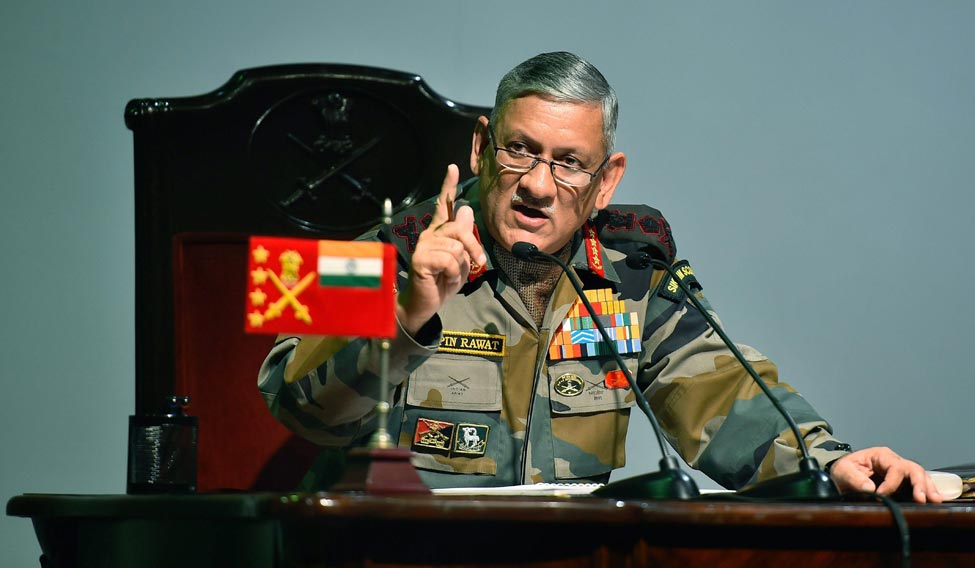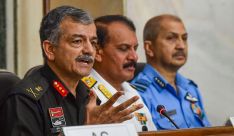Army chief General Bipin Rawat decided to take a strong stand against both Pakistan and China, countries with which India has fought wars. On the occasion of 70th Army Day, General Rawat warned Pakistan for violating ceasefire agreement by saying "we (Indian army) will take even stronger steps against our enemies if we are compelled to do so."
Soon after his statement, Indian army killed seven Pakistani soldiers including a Major in a retaliatory action along the Line of Control in Janglote area opposite Mendhar sector. An army officer responded by saying that Pakistan troops have been aggressive and targeting Indian posts on the border since Saturday. "We responded strongly, resulting in seven fatal casualties and four injuries on Pakistan’s side across the LoC opposite Mendhar,” said an officer.
The year 2017 witnessed over 800 instances of ceasefire violations by Pakistan, to which the Indian army responded strongly. "Both sides have enhanced the intensity and calibre of artillery, which led to maximum killings on both sides,"a senior army officer said while explaining the reason for killings on Pakistani side.
In 2017, 138 Pakistan soldiers were killed in retaliatory action by the Indian army on the LoC. However, in the same period, 28 Indian troops were martyred in the firing from Pakistani side.
Monday's army action was in retaliation to the killing of Lance Naik Yogesh Muralidhar Bhadane, 28, from Dhule district of Maharashtra, who was martyred in the firing from across the border in Sunderbani sector of Rajouri district on Saturday.
General Rawat, while addressing soldiers on Army Day said: “Pakistan’s forces are helping infiltrators, if they provoke us further, we will take stronger action.”
Army sources claimed that after the surgical strike and then killing of self-styled commander of terror outfit Hizbul Mujahideen—Burhan Wani—Pakistan army was desperate to mark its existence in the power corridor. So they decided to be aggressive on the border with artillery firing and repeated Border Action Team assaults on Indian troops.
Rawat also took on Pakistan's ally China by saying the the time had come for India to shift focus to its northern border. "The country was capable of handling China’s assertiveness along the border," General Rawat told media on the occasion of Army Day's customary annual presser. He also said that India cannot allow its neighbours to drift away to China, amidst aggressive Chinese efforts to increase its influence in the region.
Beijing did not like the army chief's comment and reacted sharply. While stressing that in 2017, India-China relations witnessed some twists and turns, China's foreign minister spokesperson Lu Kang said, "Under such background, the unconstructive remarks by the Indian senior official (Gen Rawat) not only go against the consensus reached by the two heads of state but also do not conform to the efforts made by the two sides to improve and develop bilateral relations."
After the 78 days stand-off in Doklam plateau, both Indian and Chinese armies have been maintaining their presence in the area. In fact, in an unusual move, Chinese armies, for the first time during winter, have been maintaining their presence in the area and sitting at a distance of 30km from the faceoff site.
Defence officials maintained that after the Doklam incident, it has been observed that the Chinese have increased their road construction activities in the area. Chinese army is building up its infrastructure in the area by digging tunnels to avoid detection by satellite or drones and to transport its military assets.
While on the other hand, Indian side is also building its infrastructure along the Line of Actual Control. As per the operational requirement of the army, 530 roads of length 22,803km have been identified for construction/improvement by Border Roads Organisation (BRO).
During the last three years, formation cutting of 3,702km, surfacing of 6,296km, permanent works worth Rs 3,558 crores and major bridges of 6,088m length have been carried out.
73 roads have been identified as strategic Indo-China border roads (ICBR), out of which 61 ICBRs have been entrusted to the BRO with a length of 3,417.50 km which were planned to be completed by 2012. But as of now, only 27 roads of its length of nearly 922km have been completed while other 34 roads are under construction, the government stated in parliament.











